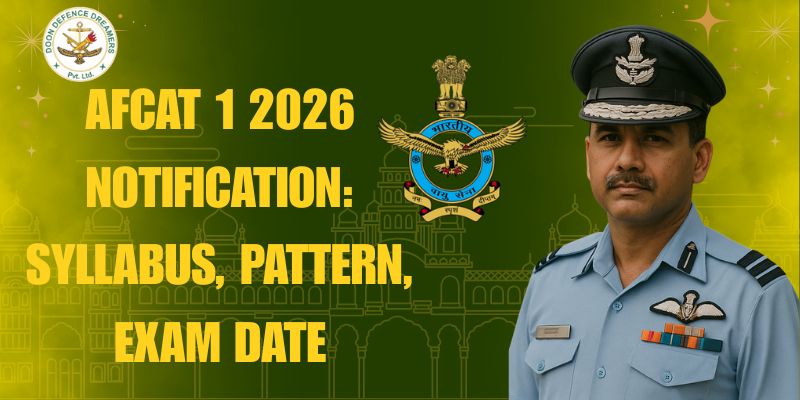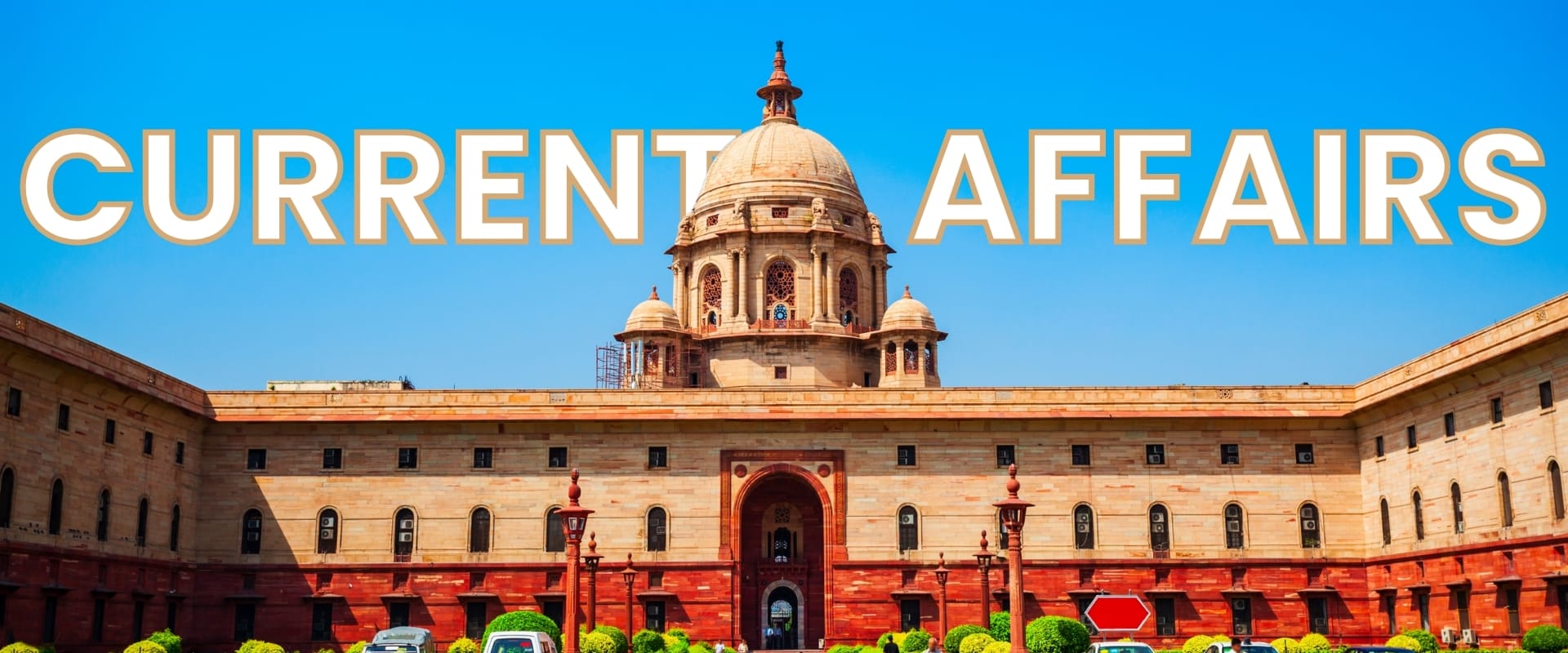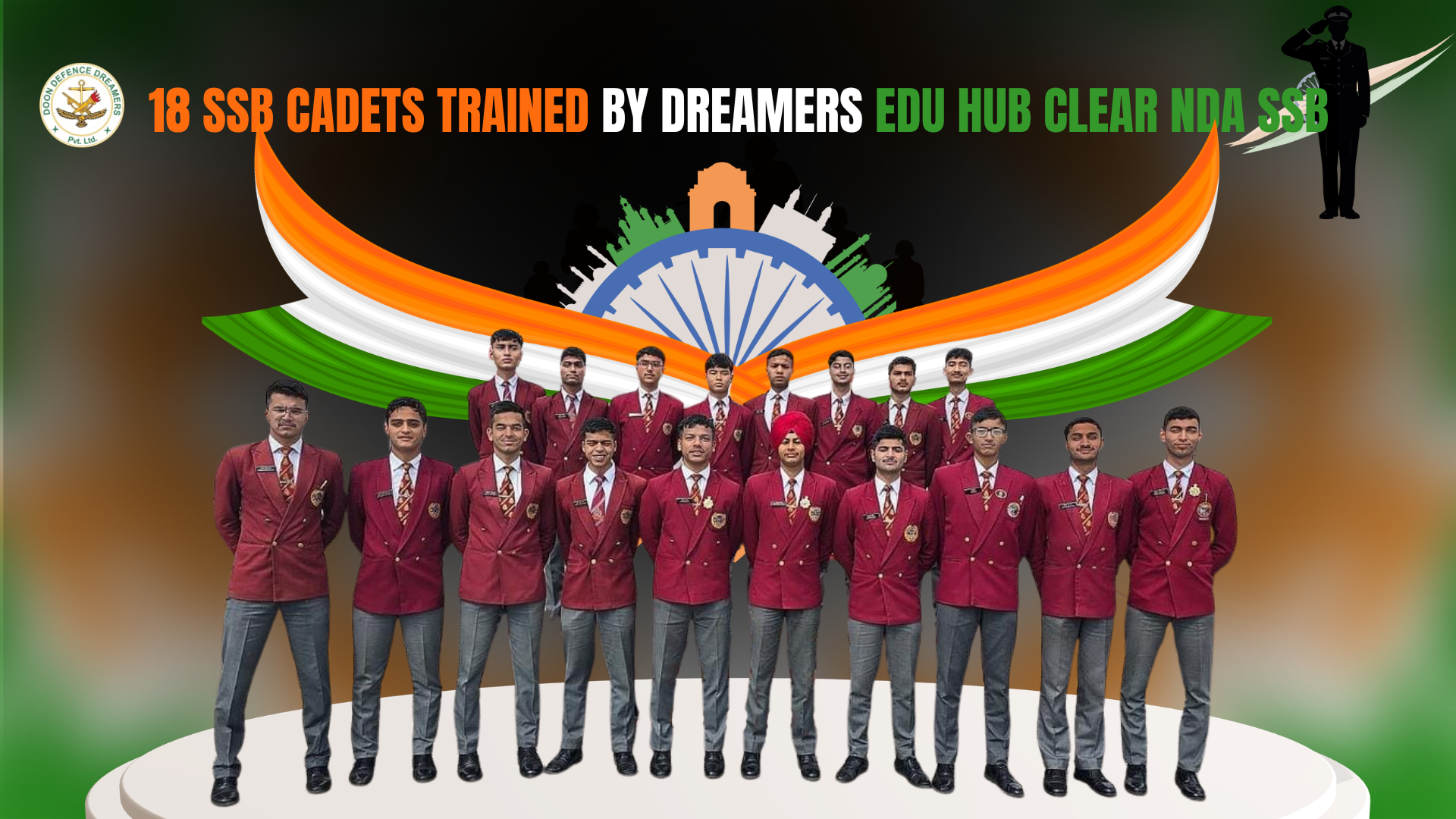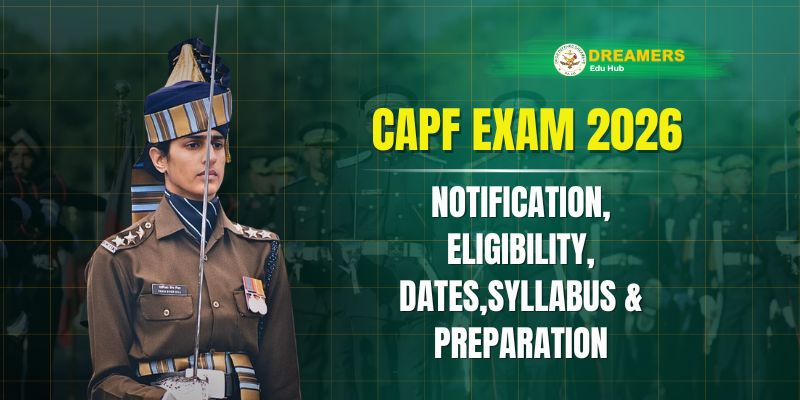The Indian Air Force (IAF) plans to release the AFCAT 1 2026 notification in November 2025. This marks the start of one of India’s most prestigious defense recruitment processes. The Air Force Common Admission Test (AFCAT) is a vital step that opens paths to both flying branch and ground duty positions in technical and non-technical posts.
The expected timeline shows candidates can submit their AFCAT apply online applications between 10 November 2025 – 09 December 2025. The AFCAT exam will likely take place in 31 Jan 26 (Saturday). Each branch comes with specific AFCAT age limit requirements – flying branch needs candidates between 20-24 years, while ground duty positions welcome applicants between 20-26 years. The AFCAT syllabus covers General Awareness, Verbal Ability in English, Numerical Ability, and Reasoning and Military Aptitude. Flying officers can expect an AFCAT salary 2026 range between Rs. 56,100 – Rs 1,77,500.
This piece covers qualification requirements, application process, detailed AFCAT syllabus 2026, and examination pattern to help you prepare well for this career-shaping chance.
AFCAT 1 2026 Notification and Key Dates
The Indian Air Force releases the AFCAT 1 2026 notification twice a year. You’ll see the first notification in November and the second, known as AFCAT 2, in May.
Expected release date of notification
The AFCAT 1 2026 notification will come out in November 2025. You’ll find all the details about the exam process, vacancies, eligibility, and how to apply. The AFCAT short notification and detailed notifications will be released together in December 2025.
Important dates: application, exam, result
Here’s the timeline for AFCAT 1 2026:
| Milestone | Date / Window | Notes |
| Short & Detailed Notification | 03 November 2025 | Start checking from November; full PDF likely by December 2025 |
| Application Start | 10 November 2025 | Apply online on official portals |
| Application Deadline | 09 December 2025 | Window usually ~30 days |
| Official Notification | 10 November 2025 | Download Now |
| Admit Card | January 2026 | Download from portal |
| AFCAT Exam | January 2026 | 31 Jan 26 (Saturday) |
| Result | To be announced | Typically 3–4 weeks after exam |
| AFSB Interview | March–April 2026 (Tentative) | Schedule allotted post result |
Add these dates to your calendar right away. The AFCAT apply online window stays open for about a month. Make sure you have all your documents ready before it begins.
Where to find the official notification
You can download the official AFCAT 1 2026 notification from these Indian Air Force websites:
- afcat.cdac.in (click here)
- careerindianairforce.cdac.in (click here)
Start checking these websites from November 2025 for any early announcements. The complete notification PDF contains everything about exam qualifications, AFCAT age limit, and registration fees.
Eligibility Criteria for AFCAT 1 2026
Your first step to an Indian Air Force career through AFCAT 1 2026 starts with meeting the eligibility criteria. Make sure you meet these basic requirements before you start preparing.
Nationality and marital status
The AFCAT 1 2026 notification states that candidates need to be Indian citizens under the Indian Citizenship Act, 1955. All applicants must be single when their course begins. This rule is non-negotiable. The IAF will dismiss candidates who get married during training and ask them to repay all training expenses. Getting married is not allowed throughout the training period.
AFCAT Age Limits As On 01 January 2027
| Branch | Age Range | Birth Window |
| Flying | 20–24 years | 2 Jan 2003 – 1 Jan 2007 |
| Flying (with valid CPL) | 20–26 years | CPL extends upper age limit to 26 |
| Ground Duty (Tech/Non‑Tech) | 20–26 years | 2 Jan 2001 – 1 Jan 2007 |
Educational qualifications required
Each branch needs specific educational qualifications:
| Branch | Minimum Education |
| Flying | 10+2 Maths & Physics 50%+ AND Graduation (any discipline) 60%+ OR BE/B.Tech 60%+ |
| Ground Duty (Technical) | 10+2 Maths & Physics 50%+ AND 4‑year Engg degree 60%+ |
| Ground Duty (Non‑Tech) | Graduation 60%+ (specific streams like Accounts have special requirements) |
Final year students eligibility
Final-year students can apply for the AFCAT 1 2026 exam. They need to complete their graduation before training starts and show all required documents at the AFSB stage. On top of that, they should have no backlog in their studies and must score at least 60% marks.
Note that you might face disqualification at any stage of selection if you don’t meet these criteria, whatever your exam performance may be.
AFCAT Syllabus and Exam Pattern
The AFCAT 1 2026 exam requires a complete understanding of its syllabus and pattern. Candidates should prepare systematically according to the AFCAT syllabus 2026 to secure their place in the Indian Air Force.
Subjects covered in the AFCAT exam
The AFCAT syllabus covers four major subjects that help assess the skills an Air Force officer needs:
- General Awareness: Knowledge of history, geography, sports, national organizations, defense, current affairs, and simple science
- Verbal Ability in English: Language skills through comprehension, error detection, and vocabulary
- Numerical Ability: Mathematical aptitude with questions on decimal fractions, time and work, percentages, etc.
- Reasoning and Military Aptitude Test: Logical thinking through verbal and non-verbal reasoning
| Section | Topics (Indicative) |
| English (Verbal Ability) | Comprehension, Error detection, Sentence completion, Synonyms/Antonyms, Cloze test, Idioms & Phrases, Analogy, Para‑jumbles |
| General Awareness | History, Geography, Sports, Art & Culture, Personalities, Environment, Indian Polity, Economy, Sci & Tech, Defence, National/International Orgs, Current Affairs |
| Numerical Ability | Decimal/ Fractions, Ratio & Proportion, Percentages, Profit/Loss, SI/CI, Time & Work, Time & Distance, Mixtures, Probability, Number Systems, Clocks |
| Reasoning & Military Aptitude | Verbal & Non‑verbal reasoning, Spatial ability, Logical patterns |
AFCAT exam pattern and marking scheme
The AFCAT exam uses a computer-based format with these parameters:
| Paper | Qs | Marks | Duration | Marking |
| AFCAT (All branches) | 100 | 300 | 2 hours | +3 correct, −1 incorrect |
- Total duration: 2 hours
- Number of questions: 100
- Maximum marks: 300
- Marking scheme: +3 marks for correct answers, -1 mark for incorrect answers
- Candidates can manage their time flexibly across all sections
EKT exam for technical candidates
Technical branch applicants must take the Engineering Knowledge Test (EKT) after the AFCAT exam:
| Paper | Qs | Marks | Duration | Note |
| EKT | 50 | 150 | 45 min | −1 for wrong answers |
- Duration: 45 minutes
- Total questions: 50
- Maximum marks: 150
- Negative marking: -1 for wrong answers
The EKT syllabus changes based on engineering discipline:
Mechanical Engineering: Thermodynamics, fluid mechanics, engineering mechanics, materials science.
Computer Science: Information technology, computer networks, digital electronics, data structures.
Electrical & Electronics: Microwave engineering, electronic devices, telecommunication systems, control engineering.
The AFCAT 1 2026 notification provides these details so candidates can understand what they must learn to excel in this prestigious examination.
AFCAT Selection Process and AFSB Interview Details
The AFCAT exam is just the beginning. Candidates must go through a multi-stage AFCAT selection process that reviews their officer-like qualities and IAF suitability. The AFCAT 1 2026 notification outlines this thorough assessment to select the best candidates for training.
| Stage | What Happens | Key Components |
| Written | CBT + EKT (if Tech) | Score must clear cutoff |
| AFSB Stage 1 | Screening | OIR (verbal/non‑verbal), PPDT; held at Dehradun/Mysore/Gandhinagar/Varanasi/Guwahati |
| AFSB Stage 2 | Psych + GTO + Interview | TAT, WAT, SRT, SDT; Group Discussions/Planning, PGT, Command Tasks, IO; Personal Interview & Conference |
| Medical | Comprehensive medicals | By designated boards |
| Final Merit | Combined merit | Written + AFSB performance |
Written exam and EKT (if applicable)
The selection starts with an online Computer Based Test (CBT). This test has 100 MCQ questions worth 300 marks. Technical branch candidates need to take the Engineering Knowledge Test (EKT) right after. The EKT comes with 50 questions worth 150 marks to test their engineering knowledge. Candidates should score above the cutoff marks to move ahead.
AFSB Stage 1: OIR and PPDT
The screening test takes place at various AFCAT exam centres including Dehradun, Mysore, Gandhinagar, Varanasi, or Guwahati. Candidates take the Officer Intelligence Rating (OIR) test to assess their verbal and non-verbal reasoning skills. This is followed by the Picture Perception and Discussion Test (PPDT). Only those who clear Stage 1 move on to detailed testing.
AFSB Stage 2: Psychology, Group Tasks, Interview
Stage 2 runs for about five days and consists of:
- Day 1: Psychological tests that include Thematic Apperception Test (TAT), Word Association Test (WAT), Situation Reaction Test (SRT), and Self-Description Test
- Days 2-3: Group Testing Officer (GTO) tasks with Group Discussions, Planning Exercises, Progressive Group Tasks, Command Tasks, and Individual Obstacles
- Days 4-5: Personal interview with senior officers and a final conference
Medical exam and final merit list
Shortlisted candidates go through detailed medical examinations. The final merit list combines scores from the written exam and AFSB interview performance. This complete evaluation process helps IAF pick candidates who excel in intellectual ability, leadership potential, and physical fitness.
AFCAT Preparation Tips
To maximize your chances of success in the AFCAT 1 2026 exam, consider these preparation tips:
- Thoroughly review previous years’ AFCAT question papers to understand the exam pattern and types of questions asked.
- Create a study schedule that covers all sections of the AFCAT syllabus 2026 equally.
- Practice time management by taking mock tests under timed conditions.
- Stay updated with current affairs and general knowledge, especially related to the Indian Air Force and defense sector.
- Improve your English language skills through regular reading and vocabulary exercises.
- For technical candidates, focus on your specific engineering discipline for the EKT.
- Develop your reasoning and analytical skills through daily practice of aptitude questions.
- Prepare for the AFSB interview by working on your communication skills and staying informed about Air Force operations.
- Maintain physical fitness as it’s an essential part of the selection process.
- Join AFCAT preparation forums or study groups to share resources and discuss doubts.
Doon Defence Dreamers’ Success in AFCAT 2025
Doon Defence Dreamers celebrates our exceptional success in AFCAT 2025. This is proof of our focused training approach for the afcat exam.
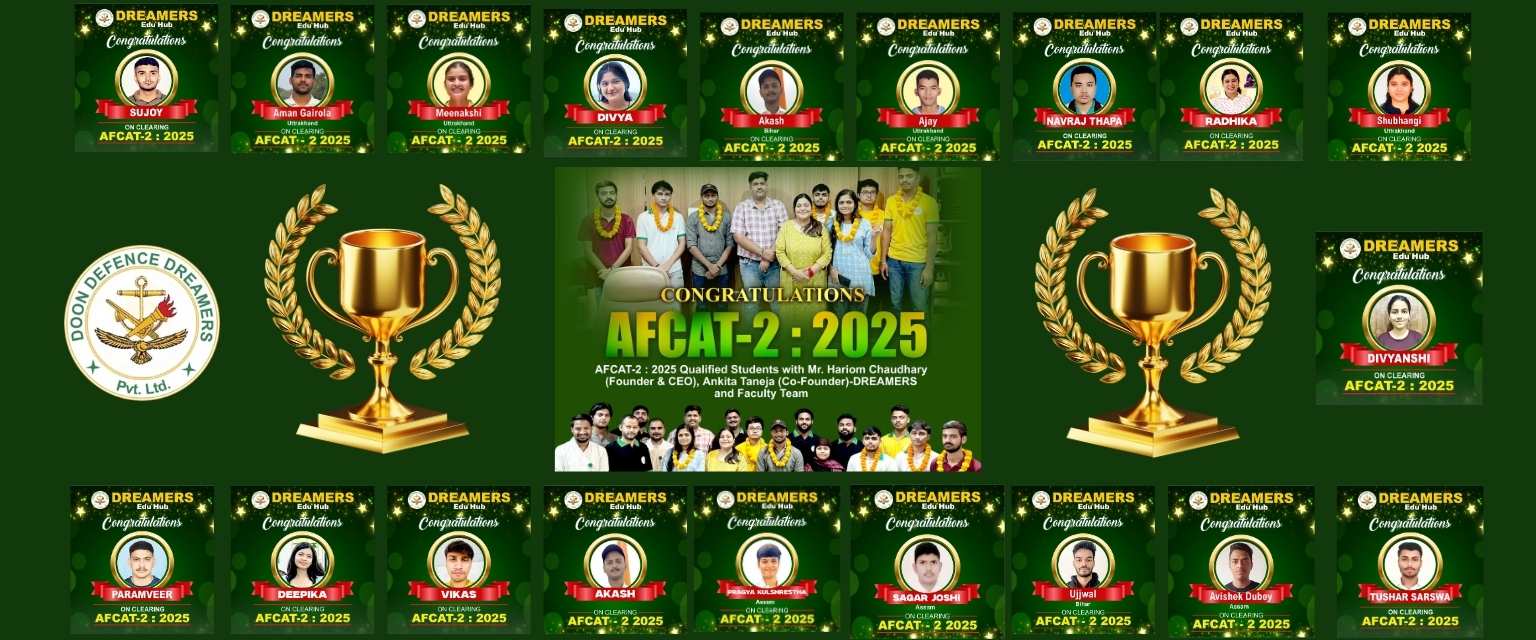
Our selection record in AFCAT 2025
We reached a major milestone when 24 students qualified for the next selection stage. These results showcase our training methods and structured preparation environment. Every selection adds to our legacy of shaping future Air Force officers.
How we prepare students for AFSB
Our afcat exam qualification preparation extends beyond written tests. Ex-officers lead specialized AFSB coaching sessions. We stand out as India’s Best NDA Coaching Institute in Dehradun that creates individual-specific learning modules based on student’s strengths and weaknesses.
Mock tests, study material, and mentorship

Our complete AFCAT test series covers Verbal Ability, Numerical Ability, Reasoning, and General Awareness. Students take full-length mock tests and receive detailed performance analysis to track their progress. This helps them boost both speed and accuracy for the actual examination.
Why students trust Doon Defence Dreamers
Expert guidance from our experienced faculty makes us stand out. Our comprehensive approach to afcat age eligibility criteria and preparation makes us the top choice for aspirants awaiting the afcat 1 2026 notification.
FAQs
Q1. What is the expected timeline for AFCAT 1 2026?
The AFCAT 1 2026 notification is expected to be released in December 2025. Applications will likely open immediately after, with the exam scheduled for February/March 2026.
Q2. What are the AFCAT age limit requirements for different branches in AFCAT 1 2026?
For the Flying Branch, candidates must be 20-24 years old. Ground Duty (Technical & Non-Technical) positions accept applicants between 20-26 years. Age is calculated as of January 1, 2027.
Q3. What subjects are covered in the AFCAT syllabus?
The AFCAT syllabus covers four main subjects: General Awareness, Verbal Ability in English, Numerical Ability, and Reasoning and Military Aptitude. Each section carries equal weightage in the 100-question, 300-mark exam.
Q4. Is there an additional test for technical candidates?
Yes, candidates applying for technical branches must take the Engineering Knowledge Test (EKT) in addition to the AFCAT. The EKT consists of 50 questions to be completed in 45 minutes.
Q5. What does the AFSB interview process involve?
The AFSB interview is a multi-day process that includes psychological tests, group tasks, and personal interviews. It evaluates candidates’ officer-like qualities beyond academic knowledge, typically lasting about five days.
Q6. How can I access previous AFCAT question papers?
Previous years’ AFCAT question papers are often available on the official AFCAT website or various online preparation platforms. Reviewing these can give you a good idea of the exam pattern and types of questions asked.
Q7. When will the AFCAT result 2026 be announced? The exact date for the AFCAT result 2026 announcement will be communicated after the exam. Typically, results are declared within 3-4 weeks after the examination.
Q8. What is the AFCAT 2 2025 and how is it different from AFCAT 1 2026?
AFCAT 2 2025 refers to the second cycle of the AFCAT exam in 2025, usually held in August. AFCAT 1 2026 is the first cycle for the year 2026, typically conducted in February. Both follow the same pattern and syllabus but are held at different times of the year.
Q9. How can I prepare for the AFCAT exam?
To prepare for the AFCAT exam, focus on the AFCAT syllabus 2026, practice with previous years’ question papers, stay updated with current affairs, improve your English language skills, and work on your reasoning and analytical abilities. Consider using AFCAT preparation tips from successful candidates and official sources.
Q10. What is the expected AFCAT salary 2026 for selected candidates?
The AFCAT salary 2026 for flying officers is expected to range between Rs. 56,100 – Rs 1,77,500, depending on rank and years of service. This includes various allowances and benefits provided by the Indian Air Force.


